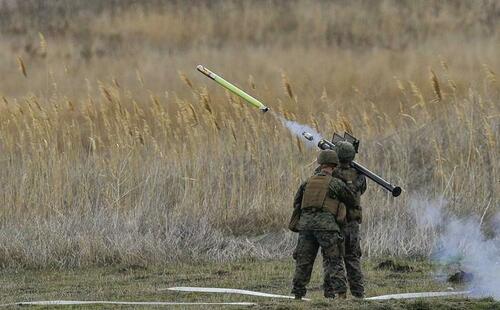
Precisely one month ago we highlighted that amid the frenzy to handover Pentagon weapons to Ukraine's forces ostensibly in order to stave off the Russian onslaught, Raytheon Technologies Corporation warned of depleting supplies and thus near-term future production delays for some vital weapons systems, notably the Army's famed Stinger should-fired missile system.
Robert Spingarn from Melius Research asked Raytheon CEO Greg Hayes at the time: "Will the Army replace the current 1,400 stingers that were sent to Ukraine?" Hayes replied Raytheon is "currently producing stingers for an international customer, but we have a very limited stock of material for stinger production."
Like with everything related to the ease with which Congress and the administration shovels taxpayer money overseas, the Pentagon has apparently come up with a solution... in the form of more, more, more taxpayer money. "The U.S. Army has signed a deal to buy $687 million worth of anti-air Stinger missiles to replenish stocks sent to Ukraine, sources said on Friday," Reuters reports.

The Stingers are in "hot demand" we are told: "The shoulder-fired anti-aircraft Stinger missiles made by Raytheon Technologies were in hot demand in Ukraine, where they have successfully stopped Russian assaults from the air, and in neighboring European countries who fear they may also need to beat back Russian forces," writes Reuters further.
Again, late last month it was one of the DoD's biggest contractors that "alerted" the Pentagon that it needs to do some urgent replentishing.
Raytheon's Hayes had described that "DoD hasn't bought a stinger in about 18 years. And some of the components are no longer commercially available, and so we're going to have to go out and redesign some of the electronics in the missile of the seeker head."
Hayes said it's "going to take us a little bit of time" to ramp up production and doesn't expect DoD to place large replenishment orders for stingers until 2023 or 2024.
Within the opening three months of Russia's invasion, the US has sent at least than1,400 Stinger anti-aircraft missiles to Ukraine. With stingers in limited production, this could be problematic for the West if the conflict in Ukraine broadens.
During his visit to Lockheed Martin's Troy, Alabama plant, Joe Biden pushed for approval of his proposed $33 billion military aid package to Ukraine by claiming Ukrainians were naming their children "Javelin" and "Javelina" after the anti-tank missile the plant manufactured. pic.twitter.com/zNPiKRjSrw
— Max Blumenthal (@MaxBlumenthal) May 4, 2022
The Army recently sent out a request for a next-generation infrared homing surface-to-air missile with plans to award a contract in the 2Q23, though the new missiles won't be fielded until 2028.
The Russians have meanwhile warned that any foreign weapons system that targets Russian assets in Ukraine will mark a severe escalation, for which Moscow will hold the foreign country sending the weapons responsible.
Meanwhile, where it's all headed... military-industrial complex stays mega-rich, while American people see their savings plummet and devalued:
By the time the war is over, Lockheed Martin will be worth $1 quadrillion. https://t.co/Lkw68nQgVh
— zerohedge (@zerohedge) May 19, 2022
Precisely one month ago we highlighted that amid the frenzy to handover Pentagon weapons to Ukraine’s forces ostensibly in order to stave off the Russian onslaught, Raytheon Technologies Corporation warned of depleting supplies and thus near-term future production delays for some vital weapons systems, notably the Army’s famed Stinger should-fired missile system.
Robert Spingarn from Melius Research asked Raytheon CEO Greg Hayes at the time: “Will the Army replace the current 1,400 stingers that were sent to Ukraine?” Hayes replied Raytheon is “currently producing stingers for an international customer, but we have a very limited stock of material for stinger production.”
Like with everything related to the ease with which Congress and the administration shovels taxpayer money overseas, the Pentagon has apparently come up with a solution… in the form of more, more, more taxpayer money. “The U.S. Army has signed a deal to buy $687 million worth of anti-air Stinger missiles to replenish stocks sent to Ukraine, sources said on Friday,” Reuters reports.

The Stingers are in “hot demand” we are told: “The shoulder-fired anti-aircraft Stinger missiles made by Raytheon Technologies were in hot demand in Ukraine, where they have successfully stopped Russian assaults from the air, and in neighboring European countries who fear they may also need to beat back Russian forces,” writes Reuters further.
Again, late last month it was one of the DoD’s biggest contractors that “alerted” the Pentagon that it needs to do some urgent replentishing.
Raytheon’s Hayes had described that “DoD hasn’t bought a stinger in about 18 years. And some of the components are no longer commercially available, and so we’re going to have to go out and redesign some of the electronics in the missile of the seeker head.”
Hayes said it’s “going to take us a little bit of time” to ramp up production and doesn’t expect DoD to place large replenishment orders for stingers until 2023 or 2024.
Within the opening three months of Russia’s invasion, the US has sent at least than1,400 Stinger anti-aircraft missiles to Ukraine. With stingers in limited production, this could be problematic for the West if the conflict in Ukraine broadens.
During his visit to Lockheed Martin’s Troy, Alabama plant, Joe Biden pushed for approval of his proposed $33 billion military aid package to Ukraine by claiming Ukrainians were naming their children “Javelin” and “Javelina” after the anti-tank missile the plant manufactured. pic.twitter.com/zNPiKRjSrw
— Max Blumenthal (@MaxBlumenthal) May 4, 2022
The Army recently sent out a request for a next-generation infrared homing surface-to-air missile with plans to award a contract in the 2Q23, though the new missiles won’t be fielded until 2028.
The Russians have meanwhile warned that any foreign weapons system that targets Russian assets in Ukraine will mark a severe escalation, for which Moscow will hold the foreign country sending the weapons responsible.
Meanwhile, where it’s all headed… military-industrial complex stays mega-rich, while American people see their savings plummet and devalued:
By the time the war is over, Lockheed Martin will be worth $1 quadrillion. https://t.co/Lkw68nQgVh
— zerohedge (@zerohedge) May 19, 2022






